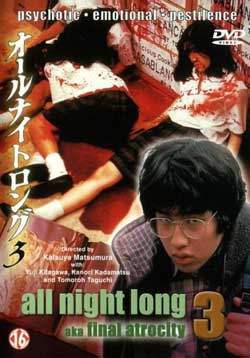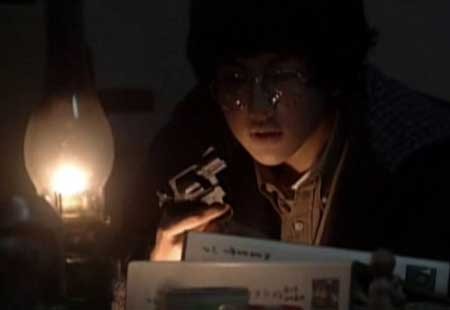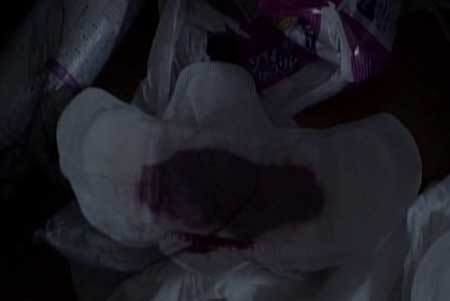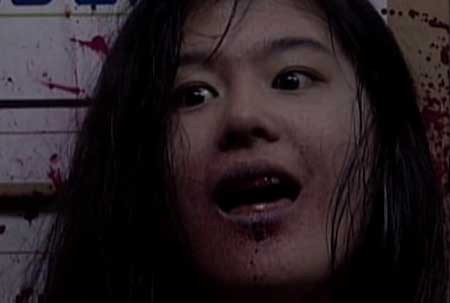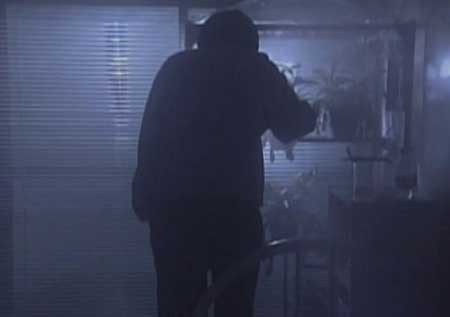SYNOPSIS:
Kikuo, a socially inept teenager, has a fascination for carnivorous plants and the minutiae of human waste. He works in a love hotel, cleaning up the filth left behind after every quickie. His isolation is reinforced by the perverse behavior of his workmates, and he soon begins to fixate on an attractive stranger. As he habitually collects her trash, more and more of her lifestyle and personal history is revealed to him. After abducting, torturing and murdering a helpless girl to further his anatomical and physiological knowledge, Kikuo witnesses the object of his desire enter the hotel and engage in the same kind of behavior as everyone else. He snaps, and all his inhibitions fade as he begins to stalk his prey.
REVIEW:
Much has been made of the bleak world of unbridled depravity perpetuated by writer/director Katsuya Matsumura in his six-part series All Night Long (1992-2009). Most viewers find each film to be a thoroughly demoralizing experience, with nothing to offset the nihilistic tone in which the series is marinated. After a very strong opening entry, which won a prize at a local film festival for its director, the second film was effectively banned from theatrical exhibition in its native Japan – a controversy far less common there than in English-speaking territories.
While there is plenty to offend in each and every one of these films – rape, graphic violence, torture and humiliation, child abuse and a blatant disregard for feelings in general – it seems to be unanimous that their harsh tone, wallowing in the innate cruelty of the human animal, is the aspect that delivers the severest shock. All Night Long 3 – far from being the “final chapter” of its title – keeps the legacy intact, with the kind of hushed ferocity that typifies the series.
High school student Kikuo lives alone with his array of plants and a computer – which helps isolate him further, allowing him to reduce living forms to tables of objective data. Dangerously close to expulsion due to being continually absent from class, he lacks the kind of support and guidance a positive role model might offer. Instead, he passively observes as a group of high school girls torments a weaker student, and his colleagues humiliate, beat and defile a young girl themselves.
He throws himself into his work, which involves removing post-coital leftovers from hotel beds. His inexplicable curiosity about human detritus leads him to explore bags of trash left on the sidewalk near home; before long, his apartment is filled with the filthy and forgotten discarded remnants of Hitomi, a pretty young woman employed at the local supermarket. Carefully preserving every item and collating the information that each piece reveals about his subject, Kikuo manages to discern his muse’s name and address, clothe a wall-mounted image of her, and chart her menstrual cycle.
Before going for the grand prize, though, he brings home the victim of his coworkers’ abuse. Tied to his bed, barely conscious, he takes her measurements (ranging from height and weight to areolar diameter and labial girth), feeds her maggots, tortures her up close and personal with a blow dryer, and sprays deodorant on her wounds. His utter objectification of the girl is chilling. When she briefly regains consciousness, she sums him up in three words: “You are trash.” When a later victim reduces him in the same way, he responds with “If people don’t treat me like a human being, I won’t treat them like one.”
Matsumura’s Tokyo is a breeding ground for sociopathic, homicidal youth – if his films are anything to go by, there are hordes of unloved, alienated outcasts ready to snap at any moment. All Night Long 3 is strengthened by the deliberate omission of authority figures and protectors; there are no parents, no teachers, no cops. The only law is that of the jungle, and the weakest of the pack is destined to be torn apart in a dispassionate frenzy. Nature decrees that the big fish eats the little fish – while the other fish do nothing more than watch.
Matsumura also helmed the similarly grim and grimy Concrete-Encased High School Girl Murder Case (1995), based on actual events that transpired in 1988. The impact of his directorial style stems from his early career in documentary filmmaking, and the cheapness of his productions only serves to heighten the realism, eroding a barrier between the viewer and the sickening inhabitants of his seedy, repellent underworld. If anything softens the blow of this installment in the All Night Long series, it would be the performance of leading actor Yujin Kitagawa (later traversing the other end of the entertainment spectrum as a pop star), which goes over the top toward the end of the film.
Fellow garbage fetishist/“trash hunter” Kawasaki (played by Tomoroh Taguchi of the Tetsuo trilogy) posits that people grow to be “perfect corpses” over the course of their life; corpses are burnable waste, so all people are trash from the moment they’re born. The director hammers this point home repeatedly. You might recall Tyler Durden, one of popular culture’s most prevalent pin-up boys, and his evocative mantra: “You’re not your job. You’re not the car you drive. You’re not the contents of your wallet.” In Katsuya Matsumura’s universe, you are what you discard.
 Horror News | HNN Official Site | Horror Movies,Trailers, Reviews
Horror News | HNN Official Site | Horror Movies,Trailers, Reviews
